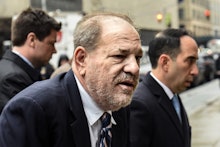Weinstein lawyer delivers a callous closing argument: "Women have choices"

Closing arguments began today in the New York trial of accused serial sexual abuser Harvey Weinstein. Over 100 women have come forward with claims that Weinstein intimidated, raped, or otherwise assaulted them, though the New York trial centers solely on the claims of two women. Jury deliberations begin next Tuesday, and if convicted, the disgraced Hollywood producer faces a possible sentence of life in prison.
Weinstein is facing five counts of rape, criminal sexual acts, and predatory sexual assault. He has denied all of the allegations, claiming that each sexual interaction was consensual. Though Weinstein wanted to testify in his own defense, his lawyers urged him not to and eventually were successful.
"Whether she thought he was fat or gross or smells or all those other things she told you, she made a choice to see him, because of the life and all the things he could provide for her," defense attorney Donna Rotunno said of Jessica Mann, one of the two women who filed the charges against Weinstein in New York City. Rotunno went on to say that Mann "couldn't keep the dates right," as if her imperfect memory negates her claims outright. "She broke down," Rotunno said. "I feel sorry for Jessica Mann."
Of the other accuser, Miriam Haley, Rotunno implied that she and her lawyer Gloria Allred are pursuing this case for the money, saying Allred "knows there's a pot of gold at the end of this trial." Rotunno also said that a conviction for Weinstein would be a lapse in "common sense" and an erasure of women's agency. "Women have choices," said the lawyer, who made headlines last week after telling The New York Times that she had never been assaulted "because I would never put myself in that position."
The trial comes two years after The New York Times published detailed reports of Weinstein’s predation, which kicked off the #MeToo movement. In their closing arguments, Weinstein lawyers appealed to the jury by claiming that the #MeToo movement had gone too far, that survivors were looking for professional opportunities in their interactions with Weinstein and needed to take responsibility for their actions.
Activists and leaders in the #MeToo movement have spoken out about the significance of this trial, saying Weinstein’s alleged victims have the chance to receive a kind of justice that many other survivors never get. According to the Rape Assault Incest National Network (RAINN), most assaults go unreported to police, and when survivors or victims do come forward, nearly every single perpetrator walks free. Rape is the most underreported crime for a number of reasons; studies have found that survivors neglected to report out of fear of retaliation, loss of job opportunities, or not being believed.
The #MeToo movement has made it possible for survivors to come forward, but it has also allowed for a greater understanding of how assault and other forms of trauma affect the brain and nervous system. During 11 days of witness testimony Weinstein’s lawyers challenged the survivors' memories and ability to recount details of their assaults, as well as their friendly communications with Weinstein after their alleged assaults at his hand.
But scores of studies have shown that trauma can lead a survivor to experience severe psychological and physiological symptoms — or no symptoms at all. That's why while some survivors may fight back fiercely in the moment and go immediately to a hospital or law enforcement official afterward, others may appear more stoic and reserved or even in denial that anything bad has happened to them. Sometimes, survivors don't fully acknowledge their rape because it's hard for them to confront such a scarring experience, or they might have choose to continue a relationship with their attacker for myriad reasons, whether out of fear or a desire for things to get back to "normal" or otherwise.
Louise Godbold, executive director of Echo, a trauma support organization for sexual assault survivors, explained in a letter the ways in which the judicial system does not understand or account for these complexities. In the letter, she wrote that "the science behind childhood trauma ... tells us exactly why many women will have frozen like I did when Harvey appeared naked or put his hands on their shoulders. It is one of the three possible conditioned responses — fight, flight, freeze — stemming from a time when you were powerless to protect yourself from an older, stronger person.” She also criticized the social pressures for women to remain polite and obedient that condition victims not to speak up in the aftermath of a traumatic assault.
The prosecution is expected to present their closing arguments in New York trial Friday. The jury will begin deliberations next week, and a verdict could be reached as soon as next Wednesday. Next month, Weinstein will face trial in Los Angeles for criminal charges of sexual misconduct. If convicted in California, Weinstein faces up to 28 years in prison.